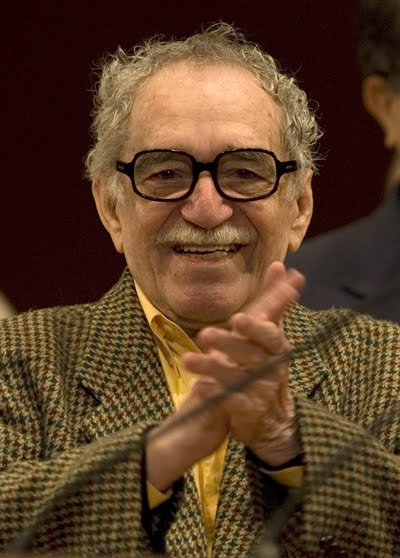Gabriel García Márquez

6 March: Gabriel José García Márquez is born in Aracataca, a town in Northern Colombia. He lives in the house of his maternal grandfather, Colonel Nicolás Ricardo Márquez Mejía, for eight years. Several of his superstitious aunts live with him, and later he would credit much of his storytelling style to his grandmother.
Primary and secondary schooling in Barranquilla and Zipaquirá, in the Colombian highlands. (In 1944 Borges publishes Ficciones.)
Studies Law at the National University in Bogotá, and at the University of Cartagena. Begins writing for El Espectador, a Bogotá newspaper.
Trades law for journalism. Writes for several newspapers, including El Espectador.
He novelizes and serializes the account of a Colombian sailor who survived ten days at sea; this serialization would later be recast as "Story of a Shipwrecked Sailor."
He is sent on assignment in Europe, and back home his friends publish his first novella, Leaf Storm.
General Pinilla shuts down the presses of El Espectador. Without a source of steady income, GGM stays in Paris, writing No One Writes to the Colonel. On a tour through socialist Europe, he writes 90 Days Behind the Iron Curtain.
Pinilla steps down. GGM relocates to Caracas and writes for Momento.
Marries Mercedes Barcha in Barranquilla. Works in Caracas, writing for several magazines and working on the stories of Big Mama's Funeral.
Sent to Havana to report on the Operación Verdad trials. In Bogotá, he sets up Prensa Latina, a Cuban press agency. For this agency he works in Colombia, Cuba, and New York.
Moves to Mexico City and finally publishes No One Writes to the Colonel.
Edits magazines in Mexico City, works in advertising and works on several film scripts.
In Evil Hour is awarded a prize back in Colombia, but the published version is heavily edited and he repudiates it.
Big Mama's Funeral is published.
Begins work on One Hundred Years of Solitude. Essentially locks himself away for 18 months.
One Hundred Years of Solitude is published to global acclaim, winning him several international awards.
Moves to Barcelona. He is awarded an honorary degree from Columbia University in New York.
Publishes Innocent Eréndira.
He founds Alternativa, a leftist newspaper in Bogotá. Becomes vice president of the Russell Tribunal.
Publishes Autumn of the Patriarch.
Spends time between Bogotá and Mexico City, working on diverse political causes. Helps found the Colombian party "Firmes," and forms HABEAS, an organization dedicated to the assistance of political prisoners. Works on film scripts.
Publishes Operación Carlota, essays on Cuba's role in Africa.
Writes weekly columns for several international papers.
Publishes Chronicle of a Death Foretold. He is awarded the French Legion of Honor.
Awarded the Nobel Prize for Literature. Publishes El odor de la guayaba ("The Fragrance of Guava"), conversations with his friend Plinio Apuleyo Mendoza. Writes Viva Sandino, a screenplay about the revolution in Nicaragua.
Publishes Love in the Time of Cholera.
Publishes The General in his Labyrinth.
Publishes Strange Pilgrims.
Publishes Love and Other Demons.
Publishes News of a Kidnapping.
Purchases Cambio, a Colombian social, political, and economics magazine. GGM is diagnosed with lymphatic cancer. The cancer diagnosis and treatment prompts him to begin writing his memoirs.
Publishes To Live to Tell It, the first volume of his autobiography.
Publishes Memories of My Melancholy Whores. This novella was banned in several countries because of its eroticism. It's the last long fiction published while he is alive.
Cambio sold to "Casa Editorial El Tiempo," the owner of Colombia's El Tiempo newspaper.
GGM says that he is working on a new novel, and the second volume of his autobiography.
All Stories, the first complete collection of all of GGM's short stories, is published.
17 April: GGM dies of pneumonia. Leaves an unpublished ms. with the working title, "We'll See Each Other in August."